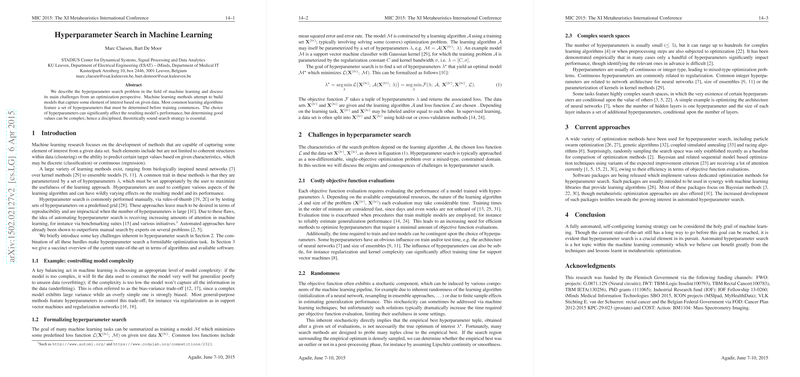Analysis of "Hyperparameter Search in Machine Learning" by Marc Claesen and Bart De Moor
The paper entitled "Hyperparameter Search in Machine Learning" by Marc Claesen and Bart De Moor presents a comprehensive exploration of the challenges and methodologies associated with hyperparameter optimization in machine learning, approached from an optimization perspective. This work explores the complexities of hyperparameter search and outlines its implications across various machine learning methodologies, where setting optimal hyperparameters is critical for achieving superior model performance.
Problem Definition and Importance
Hyperparameters in machine learning algorithms serve a critical role in configuring these algorithms to achieve optimal performance on given datasets. The paper explicates the significance of hyperparameters in models such as neural networks, support vector machines, and ensemble methods, enunciating how choices in hyperparameter settings can vastly influence the bias-variance trade-off and model complexity, with consequences on overfitting and underfitting.
Determining optimal hyperparameters is described as a complex optimization problem, wherein traditional approaches such as manual tuning and grid search are deemed inefficient and lacking in reproducibility. In contemporary settings where models often have numerous hyperparameters or demand high precision in tuning, these traditional strategies are impractical. Automation of hyperparameter tuning, therefore, becomes paramount.
Challenges in Hyperparameter Search
Several challenges associated with hyperparameter tuning are exhaustively articulated in this paper:
- Costly Objective Function Evaluations: Evaluating the model performance for each hyperparameter setting can be computationally prohibitive. This is especially true for large datasets or complex models, where training times can extend to days or even weeks.
- Stochastic Nature of Evaluations: The inherent randomness in learning algorithms and generalization performance evaluation adds a layer of complexity. This stochastic aspect implies that finding the true optimum hyperparameters is inherently uncertain, necessitating robust sampling strategies.
- Complex Search Spaces: Hyperparameter spaces can be of varied nature—continuous, integer, or even conditional—especially when dealing with complex model architectures that introduce interdependent hyperparameters.
State-of-the-art Approaches
Claesen and De Moor detail various optimization techniques currently used for hyperparameter search, including metaheuristic methodologies like genetic algorithms, particle swarm optimization, and more promisingly in recent times, Bayesian optimization and sequential model-based optimization methods. Notably, these methods are prized for their efficiency, reducing the number of objective function evaluations needed to find optimal hyperparameters.
The documentation also highlights the emergence of software tools that integrate with machine learning libraries to automate hyperparameter tuning processes. These tools predominantly incorporate Bayesian optimization techniques, suggesting these are viewed favorably within the research community for hyperparameter optimization tasks.
Implications and Future Directions
The automation of hyperparameter optimization is underscored as a pivotal step towards fully self-configuring machine learning systems. Although challenges remain, particularly in achieving a universal, automated solution, the direction suggested by the authors is clear. Leveraging techniques from metaheuristic optimization alongside advancements in computational resources can significantly bolster efforts in this domain.
The paper advocates for increased focus and investment in developing automated hyperparameter tuning frameworks, recognizing the vast potential of such advancements in broader applications of machine learning. Future developments could focus on refining existing optimization algorithms, integrating robustness against stochastic variances, and expanding toolsets that simplify adoption in applied machine learning scenarios.
In conclusion, Claesen and De Moor's work fundamentally contributes to the discourse on hyperparameter optimization, presenting critical insights and pathways that could vastly influence how machine learning models are developed and deployed, ensuring they operate at peak efficacy across diverse applications.
